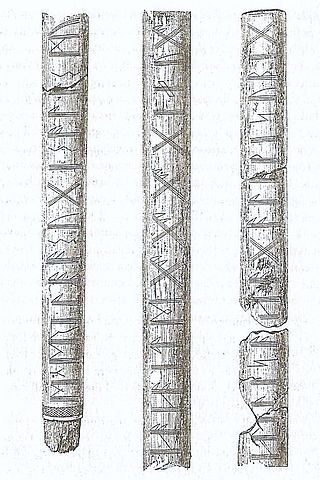Top Qs
Timeline
Chat
Perspective
Kragehul I
Lance-shaft from migration period found in Funen, Denmark From Wikipedia, the free encyclopedia
Remove ads
Kragehul I (DR 196 U) is a migration period lance-shaft found on Funen, Denmark. It is now in the collection of the National Museum of Denmark, Copenhagen, Denmark. The spear shaft was found in 1877 during the excavation of the classic war booty sacrificial site Kragehul on southern Funen. The site holds five deposits of military equipment from the period 200 to 475 AD. The spear shaft probably belongs to the latest deposit.

Remove ads
Inscription
The Elder Futhark inscription reads:
- ek e=rila=z asugisalas m=uh=a h=aite g=ag=ag=a ginu g=ah=e … lija … hagala wiju big– …[1]
The first part is normalized as:
- ek erilaz āsugīsalas muha haitē, gagaga
Interpreted as "I, the erilaz of Āsugīsalaz, am called Muha, ga-ga-ga!", where "ga-ga-ga" may be some sort of ritual chant or battle cry.[citation needed] Āsugīsalaz is a Germanic compound name, consisting of ansu-, "god", and gīsalaz, "hostage".[2] Muha also appears to be a personal name. The runes of gagaga are displayed as a row of three bindrunes based on the X-shape of the g-rune with sidetwigs attached to its extremities for the a. A similar sequence gægogæ is found on the Undley bracteate.
Remove ads
Interpretations
The gagaga and the remaining part of the inscriptions have prompted varying interpretations.
Schneider
Schneider (1969) opts for bull sacrifice, reading g-a as "gift, god!" and the remaining as
- Ginugahelija Hagala wiju bi g[aia].
- "the mighty roarer [the sacrificial bull], the Hagal, I dedicate to the spear".
Düwel
Düwel (1983) reads the thrice repeated g-a as g[ibu] a[uja] "I give good fortune". For the second part of the inscription, he has
- ginu-ga he[lmat]lija ... hag?l(a) wi[g]ju bi g[aia].
- "magical-"ga", the helmet-destroying hail I dedicate to the spear"
Pieper
Pieper (1999) reads g-a as g[ebu] a[nsu] "gift to the god [Odin]", with following
- ginu-ga hellija hag?la wiju bi g[ebu].
- "magical-god-gift, hellish hail I dedicate upon this gift"
MacLeod and Mees
MacLeod and Mees (2006) read gagaga as an onomatopoeia related to forms like the Undley bracteate's gægogæ, and read the expression as a metrical charm
- gagaga ginu gahellija, hagala wiju bi g[aize].
- "gagaga I yell resoundingly, hail I dedicate in the s[pear]"
Remove ads
See also
Notes
References
External links
Wikiwand - on
Seamless Wikipedia browsing. On steroids.
Remove ads
